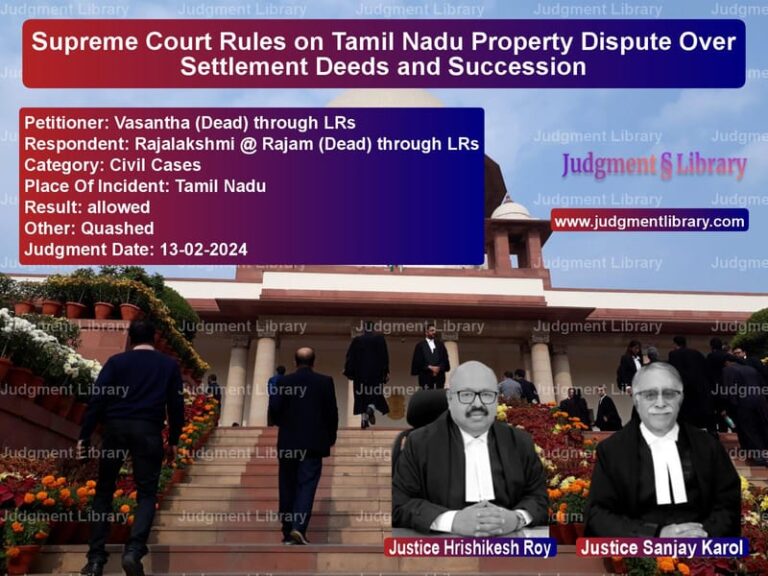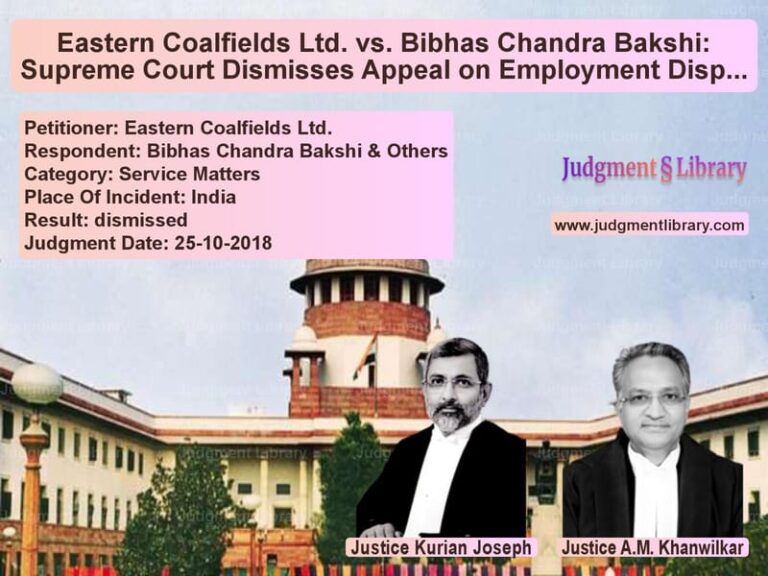Supreme Court Strikes Down Preventive Detention in V. Shantha vs. State of Telangana
The Supreme Court of India’s judgment in V. Shantha vs. State of Telangana, delivered on May 24, 2017, is a landmark ruling that clarifies the limitations of preventive detention. The case revolves around the preventive detention of the appellant’s husband under the Telangana Prevention of Dangerous Activities of Bootleggers, Dacoits, Drug Offenders, Goondas, Immoral Traffic Offenders, and Land Grabbers Act, 1986. This case highlights the importance of fundamental rights under Articles 14, 19, 21, and 22 of the Indian Constitution, reinforcing that preventive detention should not be used as a substitute for ordinary criminal proceedings.
Background of the Case
The appellant, V. Shantha, challenged the preventive detention order against her husband, issued on October 17, 2016. The detention was justified on the grounds that he was engaged in the sale of spurious seeds, leading to economic harm to farmers. The authorities argued that the normal legal procedures would be too slow to prevent further damage, necessitating his detention under the Act.
Key Legal Issues
The Supreme Court was required to determine:
- Whether preventive detention was justified when the accused was already facing prosecution under ordinary criminal laws.
- Whether the order of detention conformed to constitutional safeguards and statutory requirements.
- Whether the alleged activities of the accused met the legal threshold for preventive detention.
Arguments by the Appellant
- The appellant’s counsel, Ms. Prerna Singh, argued that preventive detention is an extreme measure and should not be invoked when ordinary laws are sufficient.
- She cited Rekha vs. State of Tamil Nadu, where the Supreme Court held that preventive detention must not be used as an alternative to criminal prosecution.
- It was further contended that the accused was already in custody for related offenses, and there was no valid reason to believe he would be released on bail.
Arguments by the Respondents
- The State of Telangana, represented by Ms. Bina Madhavan, argued that the accused’s activities caused significant harm to farmers, thereby affecting public order.
- They contended that traditional legal remedies were inadequate to prevent him from engaging in similar activities in the future.
- The State maintained that economic offenses affecting the agricultural sector had far-reaching consequences and justified preventive detention.
Supreme Court’s Observations
The Supreme Court examined the grounds of detention and the statutory provisions invoked. The key observations were:
- Preventive detention laws must be exercised within strict constitutional limits and cannot be used to bypass regular criminal procedures.
- Preventive detention is justified only when the alleged conduct directly threatens public order, which was not adequately established in this case.
- The accused was already facing criminal prosecution under the Indian Penal Code and the Seeds Act, 1966, which provided sufficient legal remedies.
- The authorities failed to demonstrate any compelling reason for assuming that normal criminal prosecution would be inadequate.
Judgment and Order
The Supreme Court ruled that the preventive detention order was unconstitutional and an abuse of power. The Court held:
“Preventive detention involves detaining a person without trial in order to prevent him/her from committing certain types of offenses. But such detention cannot be made a substitute for the ordinary law and absolve the investigating authorities of their normal functions of investigating crimes which the detenu may have committed.”
Accordingly, the Court quashed the detention order and directed that the accused be released immediately unless required in any other case.
Legal Implications of the Judgment
This decision reinforces critical principles regarding preventive detention:
- Preventive Detention vs. Criminal Law: The judgment reaffirms that preventive detention must not be used where criminal prosecution is available and sufficient.
- Protection of Fundamental Rights: The ruling underscores the judiciary’s role in preventing executive overreach that infringes on individual liberties.
- Need for Strict Scrutiny: Authorities must demonstrate a clear and immediate threat to public order before invoking preventive detention laws.
Conclusion
The Supreme Court’s decision in V. Shantha vs. State of Telangana is a significant affirmation of constitutional safeguards against arbitrary detention. By striking down the preventive detention order, the Court has reinforced the principle that no person should be detained without trial unless absolutely necessary and within the strictest legal limits. This ruling serves as a critical reminder of the importance of due process and the fundamental rights enshrined in the Indian Constitution.
Don’t miss out on the full details! Download the complete judgment in PDF format below and gain valuable insights instantly!
Download Judgment: V. Shantha vs State of Telangana a Supreme Court of India Judgment Dated 24-05-2017.pdf
Direct Downlaod Judgment: Direct downlaod this Judgment
See all petitions in Custodial Deaths and Police Misconduct
See all petitions in Fraud and Forgery
See all petitions in Extortion and Blackmail
See all petitions in Judgment by L. Nageswara Rao
See all petitions in Judgment by Navin Sinha
See all petitions in allowed
See all petitions in Quashed
See all petitions in supreme court of India judgments May 2017
See all petitions in 2017 judgments
See all posts in Criminal Cases Category
See all allowed petitions in Criminal Cases Category
See all Dismissed petitions in Criminal Cases Category
See all partially allowed petitions in Criminal Cases Category







